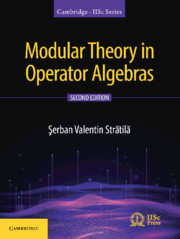Book contents
- Frontmatter
- Dedication
- Contents
- Preface to the Second Edition
- Preface to the First Edition
- Chapter I Normal Weights
- Chapter II Conditional Expectations and Operator-Valued Weights
- Chapter III Groups of Automorphisms
- Chapter IV Crossed Products
- Chapter V Continuous Decompositions
- Chapter VI Discrete Decompositions
- Appendix
- References
- Notation Index
- Subject Index
Chapter IV - Crossed Products
Published online by Cambridge University Press: 16 October 2020
- Frontmatter
- Dedication
- Contents
- Preface to the Second Edition
- Preface to the First Edition
- Chapter I Normal Weights
- Chapter II Conditional Expectations and Operator-Valued Weights
- Chapter III Groups of Automorphisms
- Chapter IV Crossed Products
- Chapter V Continuous Decompositions
- Chapter VI Discrete Decompositions
- Appendix
- References
- Notation Index
- Subject Index
Summary
Hopf–von Neumann Algebras
In this section, we consider a category of objects called Hopf–von Neumann algebras, which in a certain sense generalize locally compact groups, and also their actions on W*-algebras. The main interest of these objects consists in their giving a natural framework for the duality theory of locally compact groups.
We first introduce certain notation and conventions that will be used frequently in what follows.
Let be Hilbert spaces and von Neumann algebras. There exists a unique unitary operator
such that for all. The mapping
is then a *-isomorphism, uniquely determined, such that
The value of a linear form on a vector will also be denoted by
Let G be a locally compact group. The elements of the Hilbert space will be identified with vector-valued functions on G. Also, the linear operators on will usually be defined by specifying the elements. The formal versions of these procedures are standard and well known.
The identity mapping on will be denoted by, or by, where indicates a position in tensor products. The same convention will be used for the unit element
A Hopf–von Neumann algebra is a pair, where is a W *-algebra and is an injective unital normal *-homomorphism, called comultiplication, which is coassociative, that is
The Hopf–von Neumann algebra is said to be commutative if the algebra is commutative and is called cocommutative if
A coinvolutive Hopf–von Neumann algebra is a triple, where is a Hopf–von Neumann algebra and is an involutive *-antiautomorphism, called coinvolution, such that
An action of the Hopf–von Neumann algebra on the W *-algebra is an injective unital normal *-homomorphism such that
In this case, we also say that is an -comodule via.
Note that is an action of on.
The centralizer of the action
Clearly, is a unital W *-subalgebra of.
Let be -comodules via the actions respectively. We shall say that a normal completely positive linear mapping intertwines the actions or that is an -comodule mapping if
In particular, if there exists a *-isomorphism intertwining then we say that the actions are isomorphic.
- Type
- Chapter
- Information
- Modular Theory in Operator Algebras , pp. 229 - 330Publisher: Cambridge University PressPrint publication year: 2020



